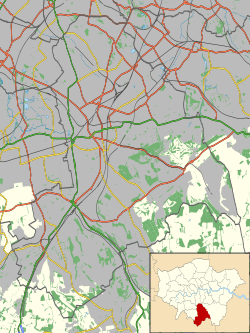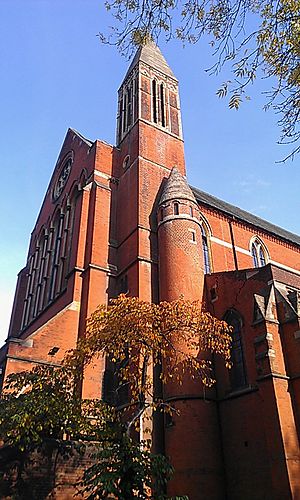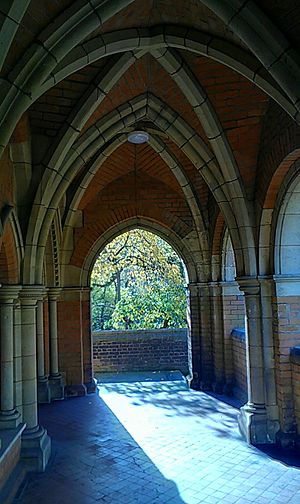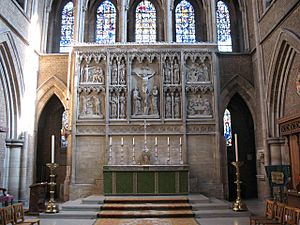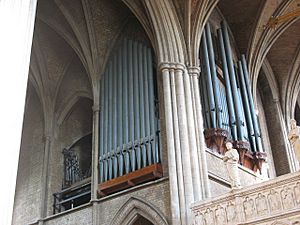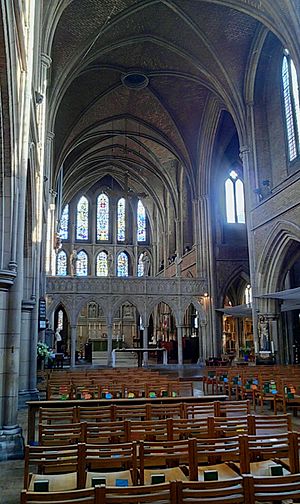St John the Evangelist, Upper Norwood facts for kids
Quick facts for kids St John the Evangelist, Upper Norwood |
|
|---|---|
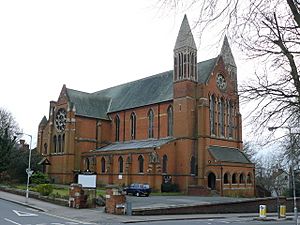 |
|
| 51°24′41″N 0°04′48″W / 51.411504°N 0.080056°W | |
| Location | 1 Sylvan Road, Upper Norwood, London, SE19 2RX |
| Country | England |
| Denomination | Church of England |
| Churchmanship | Inclusive Catholic |
| History | |
| Status | Active |
| Founded | 6 May 1878 |
| Dedication | John the Evangelist |
| Consecrated | 30 April 1887 |
| Architecture | |
| Functional status | Parish church |
| Heritage designation | Grade II* listed |
| Architect(s) | John Loughborough Pearson |
| Style | Gothic revival architecture |
| Years built | 1878 and 1887 |
| Administration | |
| Parish | Upper Norwood |
| Deanery | Croydon North |
| Archdeaconry | Archdeaconry of Croydon |
| Episcopal area | Croydon Episcopal Area |
| Diocese | Diocese of Southwark |
The Church of St John the Evangelist is a beautiful Church of England church located in Upper Norwood, a part of South London, in the United Kingdom. It is a Grade II* listed building, which means it's a very important historical place.
This church is made of red brick and was built in the Gothic Revival style. This style was popular in the Victorian era and looks a bit like medieval castles and cathedrals. The church was built between 1878 and 1887 by a famous English architect named John Loughborough Pearson. It is named after the Christian saint, John the Evangelist.
Building the Church
In the 1870s, London was growing quickly. New houses were being built in areas like Upper Norwood, which used to be countryside. People needed a place to worship, so a temporary church made of iron was set up. In 1875, it moved to where the church stands today.
In 1876, this temporary church became a proper parish church. The first vicar, Rev William Fairbairn La Trobe-Bateman, started raising money for a permanent building. More funds were added in memory of his wife, who sadly passed away in 1878.
The church hired John Loughborough Pearson, a well-known architect who had designed many churches in the popular Gothic Revival style. He planned a large church that could hold 1000 people. The first stone was laid on May 6, 1878.
Building work could only start when enough money was collected. The Church Commissioners, who help churches, gave an extra £1000. They wanted the plans to include a tower. By 1881, enough money was raised, and construction began. The church was officially opened on April 30, 1887. However, the tower was never built because of money problems.
Church Design
Pearson designed the church with a simple red brick outside and two small towers at the west end. The church is about 160-foot (49 m) long and shaped like a cross. The original plan included a 208-foot (63 m)-high tower on the south side, but it was never finished. High windows above the main part of the church let in lots of light.
Inside, the church has brick walls and arched ceilings. A striking feature is the large stone screen that separates the main area from the chancel, which is where the altar is. This screen has five pointed arches and four statues. There is also a large, beautifully carved stone decoration behind the altar called a reredos.
The church was damaged during World War II bombing. It was repaired between 1946 and 1951. Some of the original stained glass windows were lost, but a beautiful large rose window designed by Ninian Comper survived. He was a famous designer who lived nearby.
The building has had some problems with the ground sinking, which has affected its structure. Work has been done to fix this with help from the Heritage Lottery Fund and other supporters. More work is still happening to restore the inside of the church.
Music at the Church
The Church of St John the Evangelist has a long history of great music. The church organ was built in 1882 by Thomas Christopher Lewis while the church was still being constructed. It was an unusual design because the organ itself was in one part of the church, but the keyboard was on the other side.
This setup caused some issues, so the organ was rebuilt several times: in 1912, after bomb damage in 1947, and most recently in 1997-98.
The church is known for its excellent acoustics, which means sound travels very well inside. Because of this, many classical music artists use the church to record their CDs. Some groups that have recorded here include His Majesty's Sagbutts & Cornetts, Florilegium, and I Fagiolini. The church was also used for two music videos by the choir Libera.
Where to Find the Church
The church is located at the corner of Auckland Road and Sylvan Road. It's about 0.6 miles (0.97 km) south of Crystal Palace Park and 0.2 miles (0.32 km) north-east of the Croydon transmitter. The closest train stations are Crystal Palace and Anerley.
See also
 In Spanish: Iglesia de San Juan Evangelista (Upper Norwood) para niños
In Spanish: Iglesia de San Juan Evangelista (Upper Norwood) para niños
- Grade I and II* listed buildings in the London Borough of Croydon
- List of new ecclesiastical buildings by J. L. Pearson
 | Georgia Louise Harris Brown |
 | Julian Abele |
 | Norma Merrick Sklarek |
 | William Sidney Pittman |


